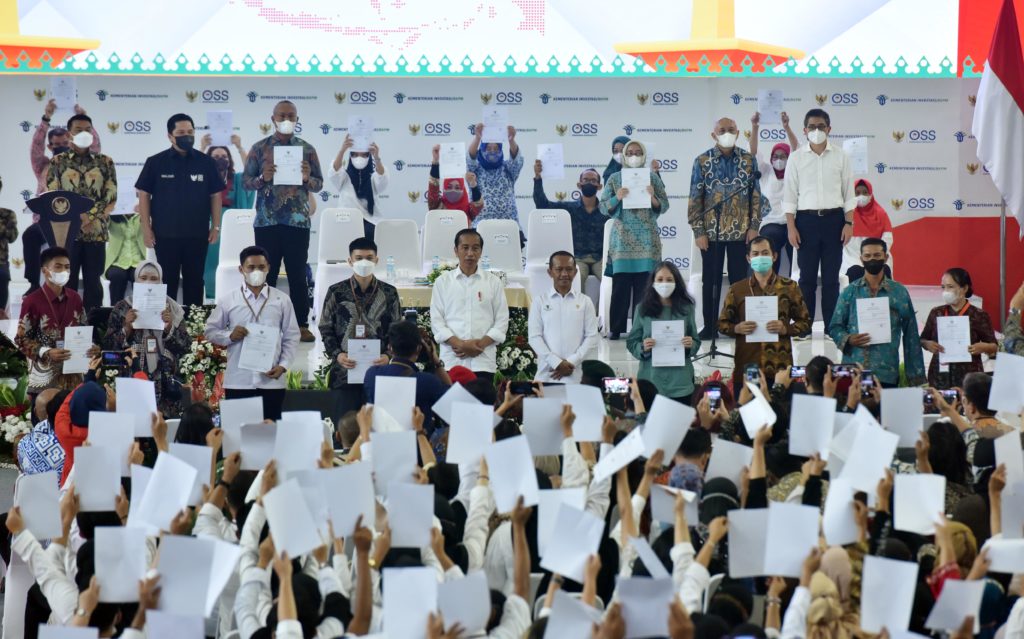Gov’t Committed to Supporting Micro, Small Businesses: Ministers

President Jokowi attends a hand over ceremony of business identification number for micro and small entrepreneurs at the Nanggala Kopassus Sports Building, Jakarta, Wednesday (07/13). Photo by: PR of Cabinet Secretariat/Jay.
The Government has launched a program to provide business identification number (NIB) for micro and small businesses.
The program, which is part of the implementation of the Job Creation Act, aims to strengthen micro and small businesses.
Minister of Investment/Head of the Investment Coordinating Board (BKPM) Bahlil Lahadalia delivered the statement in a joint press conference with Minister of State-Owned Enterprises Erick Thohir and Minister of Cooperatives and Small and Medium Enterprises Teten Masduki after the hand over ceremony of business identification number in Nanggala Kopassus Sports Building, East Jakarta, Wednesday (07/13).
“The President has launched the program for this year and we have a plan to visit 20 cities. The program is part of the implementation of the Job Creation Act, especially the OSS (Online Single Submission),” Bahlil said.
Bahlil added that the program is a collaboration between Ministry of Investment/Investment Coordinating Board (BKPM), Ministry of State-Owned Enterprises, and Ministry of Cooperatives and Small and Medium Enterprises.
“Ministry of Investment issues the permits for free, without any payment. The halal certificate and the SNI (the Indonesian National Standard) are also free. Ministry of State-Owned Enterprises will provide the funding through KUR (micro business loan) in the State-Owned banks (Himbara). Ministry of Cooperatives and Small and Medium Enterprises will carry out supervision in terms of increasing production capacity and will provide assistance,” he said.
Bahlil expressed his optimism that the collaboration and support from regional governments will benefit and strengthen micro and small businesses.
“I am of the view that we can achieve our goals with collaboration between regents, mayors, governors, agencies, and ministries, because they know about micro, small, and medium enterprises in their respective areas. Ministry of Investment will support them by providing fast, precise and efficient applications,” the Minister stated.
In the meantime, Minister of State-Owned enterprises Erick Thohir said that he will focus on three main factors. First, supporting micro, small, and medium enterprises to obtain business permit and set higher goals. Second, KUR absorption. Third, the openness of regional governments in cooperating with the Central Government.
“We have discussed the matters. We will connect the data in PNM Mekaar financing, with 12.7 million female customers and Rp 1 to 4 million loan, to micro, small, and medium enterprises data in State-Owned banks, and God willing, the number will become 1.5 million plus 10 million. It’s not impossible,” Erick said.
He further said that the Government also encourages micro, small, and medium enterprises to make use of KUR facilities to develop their businesses. The Government also aims to increase the loan ratio for micro, small, and medium enterprises to reach 30 percent by 2024.
“The President has ordered us to achieve 30 percent ratio for micro, small, and medium enterprises in 2024,” Erick said, adding that the increase in KUR distribution is expected to improve productivity of micro, small, and medium enterprises and boost economic growth in Indonesia.
On that occasion, Minister of Cooperatives and Small and Medium Enterprises Teten Masduki said that in a bid to strengthen micro, small, and medium enterprises, the Government also continues to increase the ratio of business entities entering digital platforms. The Government aims to ensure that 30 million micro, small, and medium enterprises have access to digital economy.
“Currently the number is 19 million, so in next two years we aim to have another 11 million. We have collaborated with e-commerce players to support micro businesses in secondary cities. I believe that the target will be achieved since micro, small, and medium enterprises have commitment to go online and access the digital ecosystem to boost their revenue,” Teten remarked. (SLN/UN) (RI/HD)








